|
If you’ve committed a crime, a skilled interrogator can push you to admit what you’ve done. If you’re innocent of that crime but strongly suspected of it anyway, a less principled but equally skilled interrogator can sometimes pressure and confuse you into inadvertently admitting to it anyway. But take away all of the safety restraints that we have to protect the rights of the accused and a determined interrogator can, with time and patience, force you to confess to just about anything. If you somehow doubt the validity of this statement, then a single viewing of Polish writer-director Ryszard Bugajski’s unambiguously titled Interrogation should leave you with some serious food for thought.
In Stalinist Poland in 1951, carefree cabaret singer Tonia Dziwisz (Krystyna Janda) is performing a cheeky number to the delight of a primarily male audience, when she spots her husband Konstanty (Olgierd Łukaszewicz) and her best friend Dziunia in the audience getting a little too friendly for her liking. On the completion of her song, she leaves the stage in a state of distress and reacts angrily to Konstanty’s assurance that there is nothing going on between him and Dziunia. After repeatedly failing to convince Tonia of his innocence, Konstanty heads off home, and Tonia is approached by two male admirers with the request that she join them for a drink. Almost as an act of defiance, she accepts, and in the course of the jovial evening that follows, the two men ply Tonia with booze and get her seriously drunk. Finally, the three hit the streets and Tonia hails a taxi to take her home, but passes out shortly after she and her two companions enter the vehicle. Earlier signs that the two men might not be on the level are quickly confirmed, and when the taxi reaches its true destination, the stumbling and intoxicated Tonia is pulled out, forcibly led into a room and plonked in a chair. Here, she is brusquely asked her name by a military official but is just too far gone to reply, or to realise that he is emptying the contents of her bag onto his desk behind her. She’s even too drunk to twig that something is wrong when one of the guards is ordered to undress her, half-consciously puffing on a cigarette but otherwise offering no resistance. Stripped naked and lying back on a desk, she drifts back into a stupor and is thus unaware when another guard arrives to spread her legs and a perform a gynaecological examination. She’s then redressed and carried down a concrete-walled corridor and dumped unceremoniously on the floor in a prison cell already jam-packed with sleeping women.
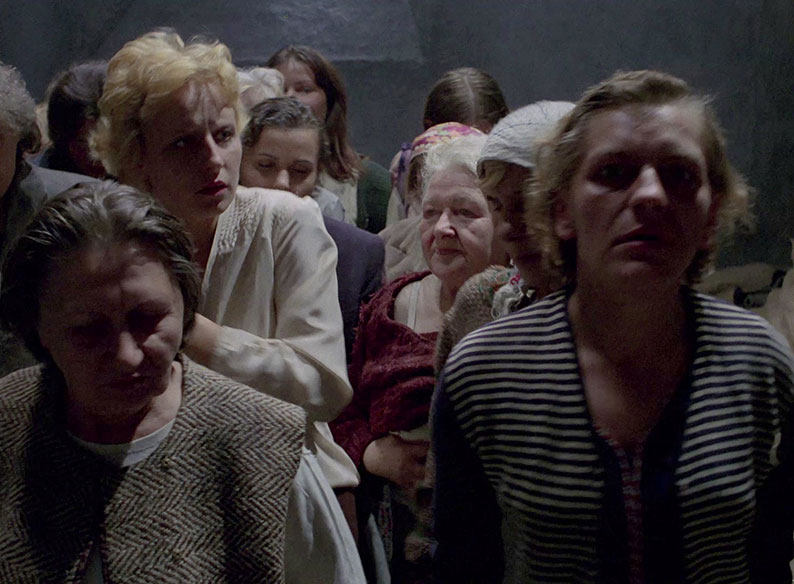
An unspecified while later, a bell rings and Tonia’s cellmates quickly wake and get to their feet, one of them sternly ordering the still dozing Tonia to do likewise. When she wakes, Tonia is understandably confused by her surroundings and starts asking questions, but the other women just tell her to line up alongside them. When the guards arrive at the barred cell door, one of the women, a presumably nominated leader, completes what is clearly a daily ritual by barking out, “Cell ready to report. Prisoners: 31. Present: 31.” The protesting Tonia pushes through in an attempt to question the guards but is quickly thrown to the floor behind them by the cell leader. The guards depart and silence returns, and the distressed Tonia sits it out until the another guard makes his rounds, then grabs his leg through the bars and urgently pleads to be allowed to contact her husband. The irritated man eventually shakes her off and moves on with a parting, “Stupid woman.”
Tonia’s tears of desperation mutate into screams of utter despair, which are forcibly silenced by her irritated cellmates. With no other obvious course of action available, she joins in with the huddled slow march up and down the small cell that is the nearest the prisoners get to exercise. That night she is woken when a guard arrives at the cell door and orders her to accompany him, not by stating her name but by calling for the letter “D” and rejecting the first two women that step forward. Tonia hurriedly makes her way over the sea of sleeping women and tells the guard who she is, clearly under the impression that she’s going to be set free. This optimism then takes a hit when the guard responds by slapping her face and reminding her that she is forbidden to say her name out loud.
Despite this, Tonia continues to exude an air of defiance as she’s marched to the office of the suit-dressed Major Zawada (Janusz Gajos), who quietly orders her to sit on a stool in the corner of the room some distance from his desk, much as a schoolmaster might a naughty schoolgirl. Tonia’s motormouth questioning is met with a calm request from Zawada for her to tell him about herself, and he confuses her further by responding to an almost mocking comment to encourage her to talk about the men she has kissed and slept with. When Tonia bounces a question about her enjoyment of sex back at Zawada, he calmly arranges the items on his desk, brushes off some dust, then gets to his feet and walks over to her. “Have you ever been to our bath?” he asks her, then adding ominously, “We can give you a bath you’ll remember for the rest of your life.” At this point I had no idea what he specifically meant, but experienced a shiver of horror at the probability that I was soon to find out.
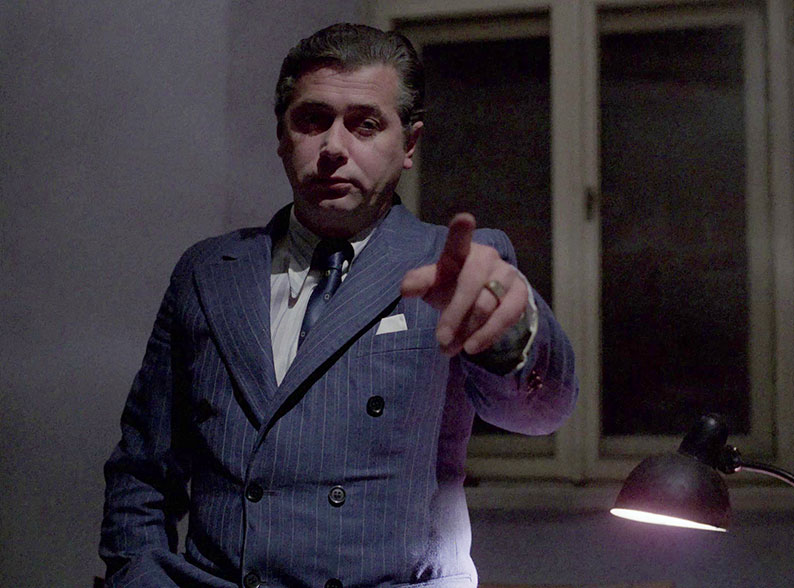
Tonia responds to Zawada’s verbal probing about her sex life by stating that some things should remain private, prompting Zawada to walk back to his desk and, in a sudden and unexpected explosion of anger, violently kick his chair over and hurl a large ink blotter in Tonia’s direction. “They’re not private!” he bellows at her furiously. “Nothing is private!” Eventually he presents Tonia with a confession to sign and a warning of the consequences of lying to him in the future. In what feels like an almost automated response, Tonia picks up the pen to comply when something about Zawada’s words gives her a pause for thought and she backs off instead and refuses. The incredulous Zawada thus hands over to his immediate subordinate, Lieutenant Tadeusz Morawski (Adam Ferency), and tells him to start the whole process of interrogation again, the prospect of which prompts Tonia to rush forward and hurriedly sign the paper after all, but Zawada has by then already closed the door behind him. “Will you let me go?” she hopefully asks Morawski, who responds with a hateful glare and the stern proclamation, “If I had my way, I’d put the likes of you up against a wall and shoot you in the back of the head.” Tonia finally realises that she’s not going to be able to easily reason her way out of this, but is still unprepared for the state-sanctioned nightmare that still awaits her.
In the interview included on this disc, director Bugajski outlines how and why this film went into production and the fate that subsequently befell it, and it’s a story with its share of unfortunate parallels and ironies. As part of the Polish artistic community of the 1970s and 80s, he wanted to tell a story that reflected his frustration at the actions of the Secret Police and restrictions imposed him and his contemporaries by the state. This dovetailed into his interest in the years in which Poland fell under Stalinist control, when innocent people were imprisoned, sent to labour camps, and even executed. Yet how was he to tell a truthful story of these times when all film production was state controlled and every script had to be approved by the censorious Ministry of Arts and Culture? Things began to change with the rise of the Solidarity (Solidarność) trade union, which became the focus of international attention and a symbol of hope for the Polish people, and inspired Bugajski to finally develop his script. In March 1981, when the government was weakened, Bugajski submitted the finished screenplay, and in what looked like a positive sign of changing times approval was granted. In September of the same year, the film went into production, but just a few short weeks after shooting was complete, martial law was declared. Fearing that the footage would be seized, Bugajski and his team literally buried it in the ground to protect it, but when no-one from officialdom came calling, it was retrieved, and Bugajski and editor Katarzyna Maciejko-Kowalczyk began the work of putting the film together. Once complete, Bugajski submitted the film to the Ministry of Arts and Culture for approval, despite his conviction that it was now unlikely to see the light of day. Unsurprisingly, given the subsequent re-hardening of lines, the film was refused a release and locked away in the studio vaults, preventing Bugajski from circumnavigating the ban and submitting it to international festivals. Fired from the studio, Bugajski emigrated to Canada and found work in television, but eight years later, following elections that saw the ruling Communist Party resoundingly unseated by the Solidarity opposition, the ban on his film was finally lifted. In a symbolic move, it received its belated Polish premiere on 13 December 1989, the seventh anniversary of the imposition of martial law.
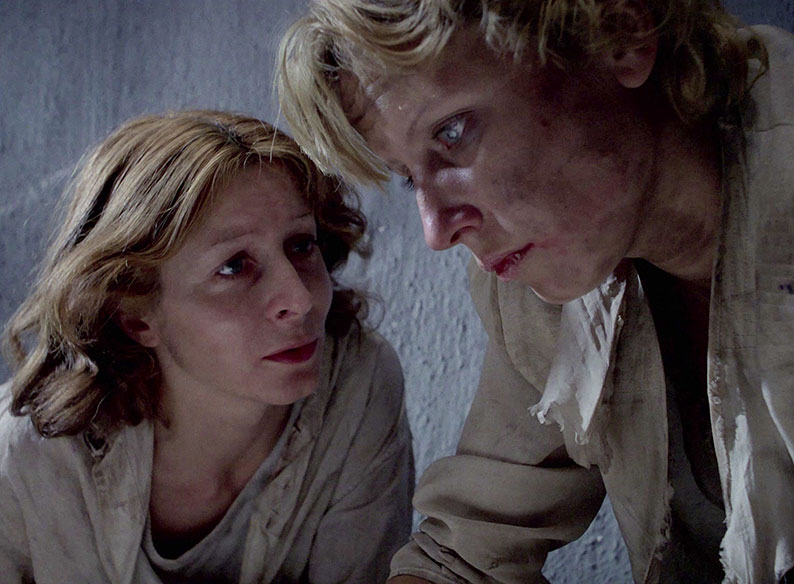
Viewed through the eyes of history, it’s not hard to see what so upset the representatives of the Polish ruling authority of the day, for whom criticism of the system and those charged with its administration was still largely forbidden cinematic territory. It says something of both the political optimism and sheer brass balls of Bugajski that he was not only willing to try but that he was unwilling to water down his condemnation, despite the trouble this would potentially land him in. And he doesn’t hold back here, laying out in grimly convincing detail how an innocent individual could be bullied, coerced and intimidated into confessing to a crime that they did not commit, a crime that was probably trumped up in the first place to target another individual that someone in authority had taken a dislike to for their political leanings. The methods applied here are varied but equally nefarious: calmly asking deliberately disorientating questions; sudden explosive changes of mood designed to startle and frighten; relentless and aggressive interrogation; overcrowded cells in which you can clearly hear the screams of the men being tortured nearby; sleep deprivation; physical violence; threats of instant execution; sudden unexpected acts of false generosity; fake stories told to tease a response that can be twisted into a confession. And then there’s the aforementioned ‘bath’, whose monstrous nature we’re clued into even before we see it in action by Tonia’s screams and struggles of fearful resistance when being dragged downstairs to this most dreaded of punishments.
All of the above may make Interrogation sound like a relentlessly bleak experience, and while it’s certainly an appropriately harrowing one at times, it never descends into complete cinematic despair. The key reason for this is Tonia herself, who may initially come across as brash, over-emotional, and a little full of herself, but these personality traits soon prove to be facets of a defiant and strong-willed woman who repeatedly proves to be a thorn in her interrogators’ collective side. Zawada has clearly been at this job for some time and is thus confident that Tonia will break sooner or later, but almost every time she hits rock bottom, something happens to reinvigorate her and frustrate her captors. This hits a peak when a she is held outside a room in which a prisoner is then executed, and she is then dragged in, the body of the dead man still in plain view, and pressed against the wall, given five seconds to cooperate or face the same fate – I’m not about to reveal how this genuinely tense scene then unfolds, but it marks a real turning point for both parties. Similarly, when the weak and weary Tonia is brought before Morawski and offered a hearty breakfast, this attempt to confuse and tease a grateful confession from her backfires when it instead reignites her cocky defiance. Unsurprisingly, perhaps, it doesn’t take the experienced Zawada long to bring her roundly back down to earth.
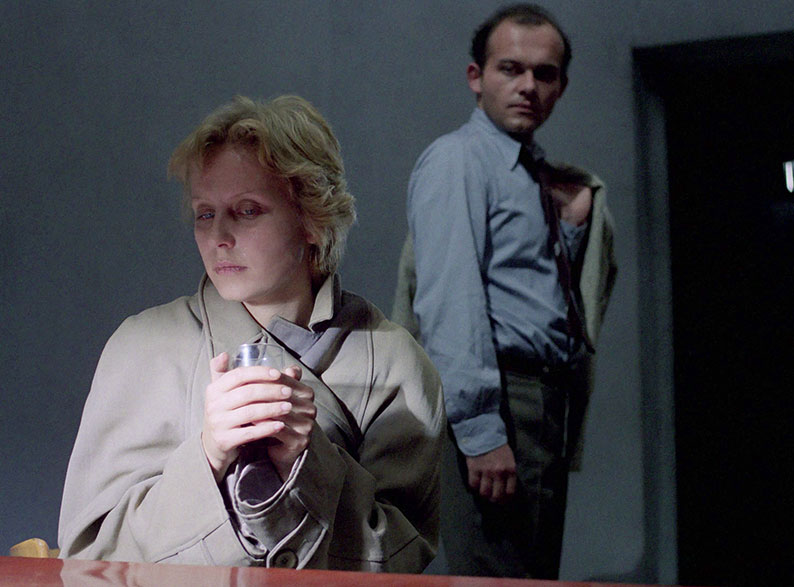
Although the film revolves almost exclusively around Tonia, her cellmates prove to be an interesting bunch whose diversity acts as a commentary on how any individual can fall foul of an oppressive regime. Leading the pack here is ebullient farmer Honorata (Bożena Dykiel), who arrives in the cell with a parcel of food that she shares with her fellow prisoners and whom the gregarious Tonia instantly befriends. Unlike the others, Honorata is guilty of the crime of which she is charged and doesn’t care who knows it, expressing no regrets at having killed a party official with an axe when he came to survey her farm for possible state seizure, despite the death sentence she now faces. It’s she who provides Tonia with an abstract symbol of hope when she scatters and waters wheat seeds from her farm on the sill between the window and the wire netting in the cell, and over time the seeds defy Tonia’s claim that nothing can grow there by individually flourishing. On the other side of the coin is communist Witkowska (Agnieszka Holland), whose dedication to the cause has convinced her that the authorities were justified in charging her with being an American spy and that her sacrifice will ultimately result in a better future for the country and its children. It’s she who lays out the reality of the situation to Tonia in a whispered conversation one night. “Take my advice and confess while you still have time,” she advises, “otherwise they may eliminate you.” “But I have nothing to confess,” Tonia points out, which elicits the ominous response, “In which case you have to invent some crime.”
More sobering is the young Mira Szejnert (Anna Romantowska), who lacks Tonia’s strength and energy and appears to have already been beaten down by the system by the time Tonia arrives to share her cell. Tonia’s friendship and support proves to be a lifeline for her, but when the two are separated she is far more vulnerable, a fact that her devious captors are all too aware of and use against Tonia. Late in the story in a similar vein (hop to the next paragraph to avoid what could count as a spoiler) the almost broken Tonia is led into a room and unexpectedly finds herself looking through a wire barrier at her husband, who without realising has become the latest tool in Zawada’s box of interrogation tricks. With Tonia stunned into distressed silence, Konstanty proceeds to berate her for behaviour detailed in confessions drawn up by her captors that she was bullied and tricked into signing. In some ways, this is the cruellest scene in the film, as after all of the punishment that has been inflicted on Tonia by this point, the one person who should be willing to stand by her and take her side instead is shown to have swallowed the lies fed to him by those in a position of power. Tragically, the lesson being taught here continues to fall on resoundingly deaf and easily manipulated ears to this day.
I was genuinely gobsmacked to discover that Interrogation was Bugajski’s first feature as director after several years working in television, as nothing in his consistently confident handling betrays this. His camera placement and editing choices – particularly his ise of facuial close-ups – are impeccable throughout, as are all of the perfectly cast actors, all of whom play their roles as if born to them. This is especially true of Krystyna Janda’s powerhouse performance as Tonia, a character she brings to life so vividly that if you told she was recreating an experience that she’d lived through, I’d believe it in a heartbeat. Every emotion here feels real, from her initial confusion and desperate attempts to convince Zawada of her innocence to her gut-wrenching terror as she is hauled off to ‘the bath’, and her slow descent into potentially suicidal despair. When hauled before Zawada in a state of exhaustion, she genuinely looks as if she’s not slept for days, and in a triumph of performance and what I presume was subtle makeup, she appears to have visibly aged by the film’s final scenes.
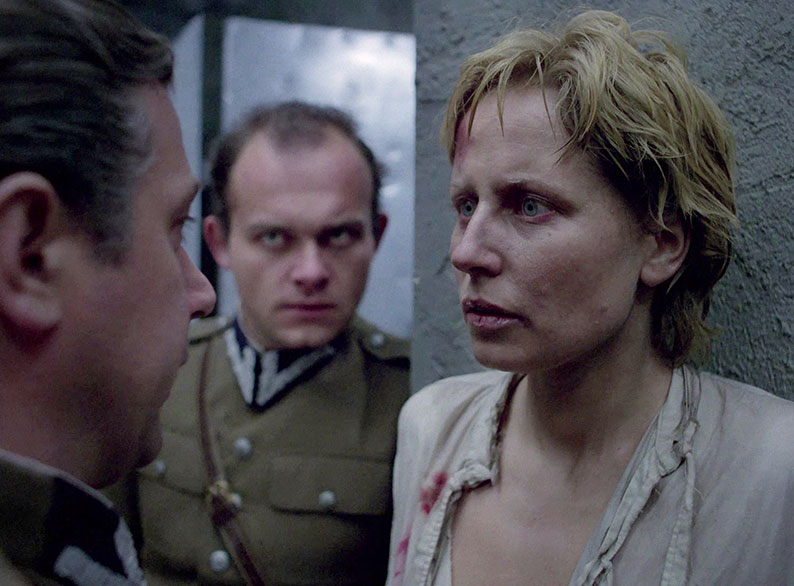
As seasoned interrogator Major Zawada, Janusz Gajos laces his surface calm with the sort of subtly sinister edge that most effectively suggests he knows full well that Tonia will eventually break, and for the simple reason that he’s broken many like her before. If I had to face him, I’d genuinely be clutching my buttocks in fear. Equally intimidating in his less guarded way is Adam Ferency as Lieutenant Morawski. Wide-eyed with angry detestation when he first faces Tonia, he later proves to be a more complex individual than this first impression suggests, and unlike his colleague he could potentially be capable of change. I’m not about to reveal how this manifests itself, but the trigger point comes during an angry outburst in which he inadvertently reveals that he spent time in a Nazi concentration camp, something never explicitly stated but that we are allowed to deduce for ourselves from the tone of his voice and what his words infer.
Utterly compelling as a drama, Interrogation is also an important record of a particularly dark time for post-WWII Poland that saw whole swathes of people arrested and imprisoned on political grounds – according to official data, by the second half of 1952 there were 49,500 political prisoners in Poland*. But the film also serves as warning from history, one that is becoming increasingly relevant with the rise of hard right politicians across the globe and the new ideologies that are emerging from the populist swamp. In the UK in just the past couple of years we’ve seen the right to protest effectively outlawed, increasing restrictions placed on the right to strike, the introduction of measures to make it more difficult for the poor and minority groups to vote in elections, and changes to boundaries to rig more seats in the government’s favour. Small steps they may be, but if they are allowed to continue, it won’t end there. As I write this, the government is attempting to push through legislation that will allow it to break international law ostensibly to ship a small number of refugees to Rwanda, a completely pointless and deeply unpopular distraction that has already cost around £290million of taxpayer’s money for no reason or return. If the bill is struck down in the House of Lords, the extreme right wing of the Conservative Party is calling for the UK withdraw from the European Convention on Human Rights. The propagandists will tell you it’s to “stop the boats” or some other meaningless three-word podium slogan, but remove the protections enshrined in this Convention and every dark deed portrayed in this extraordinary but sobering film could overnight become a grim reality for anyone this or any future government might regard as a threat. Given the wrong circumstances, as this extraordinary film reminds us, this really can happen anywhere, and to just about anyone.
Sourced from a new 2K restoration by WFDiF Poland, the 1.37:1 1080p transfer on this Blu-ray gets absolutely everything right. The image is sharp and the fine detail crisply defined, the contrast is expertly graded, solidifying black levels but still coping with low light scenes without loss of picture information, while the expressively cool-toned colour palette is handsomely captured. There is a fine film grain visible, but not a trace of any damage, dirt or dust. Just terrific.
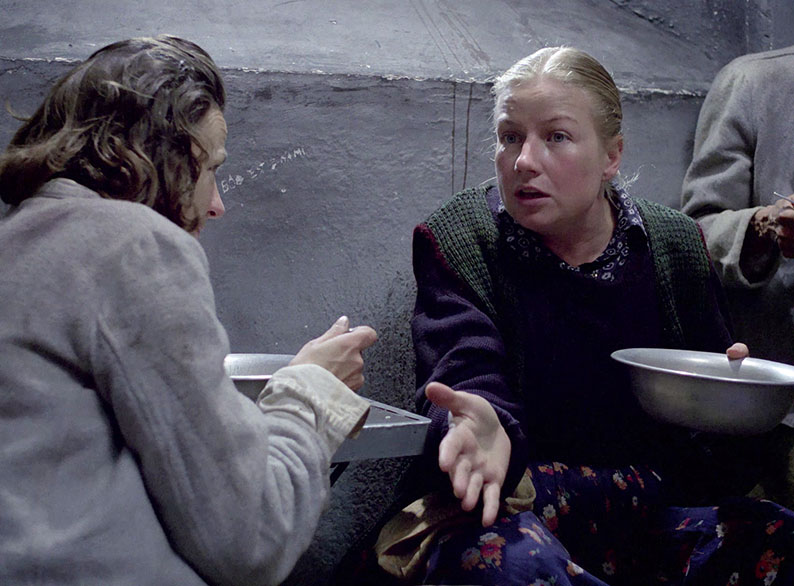
The soundtrack is presented as dual-mono LPCM 2.0 and is similarly strong, with very clear presentation of dialogue and effects (there is no music score), and free of any traces of wear or damage.
New and improved optional English subtitles activate by default but can be switched off if you’re fluent in Polish.
Director Ryszard Bugajski on Interrogation (32:01)
A 2005 interview with director Ryszard Bugajski, which I presume was recorded for the Second Run’s earlier DVD release (which I do not have), and whose bookends visually reference the film’s teasingly ambiguous final scene. Bugajski goes into fascinating detail about how the film came to be and how it was ultimately banned by the Polish authorities (this was the primary source for my comments in this in the above review), and talks about the casting of Krystyna Janda in the lead role and how his sometimes combative relationship with her on set fed effectively in her portrayal of Tonia. He reveals that the film was only finished at all because friends abroad rallied round to secure a supply of Eastman Kodak film stock, and that he surreptitiously recorded the meeting at which the film’s fate was decided, a transcript of which he reads a couple of choice quotes from. When he gets to the unbanning of the film, we’re treated to a substantial collection of news footage taken at the belated 1989 premiere. This includes brief interviews with actors Krystyna Janda, Janusz Ganos and Adam Ferency, and an introduction to the screening by celebrated filmmaker (and the film's co-producer) Andrzej Wajda, who tells the audience defiantly, “No one will tell us what to watch and what we’re not allowed to watch.” A superb featurette that touchingly ends on a textual dedication to Bugajski, who died in 2019.
Booklet
The essays that are a feature of Second Run booklets are always of the highest quality, and the one here by Michael Szporer is no exception, not only for its thoughtful reflection on the film, but also for the information on the socio-political context in which it was made and banned. Having been intrigued by Bugajski’s reading of extracts from that secretly recorded meeting at which the film’s fate was decided, I was gobsmacked to be presented here with the entire transcript of that recording, which makes for fascinating and ultimately sobering reading. Also included are a couple of scans of Bugajski’s storyboards for the film.
A compellingly handled and superbly acted document of a dark period of Polish history, one that is still being re-enacted in differing guises in various corners of the world today and should terrify anyone who appreciates the fragile nature of the freedoms that too many seem to take for granted. The HD transfer on Second Run’s Blu-ray is pristine, and while there are only two special features, both are terrific. For those who missed picking it up on its release, this excellent disc comes highly recommended.
* https://en.wikipedia.org/wiki/History_of_Poland_(1945–1989)#Stalinist_era_(1948–1956)
|